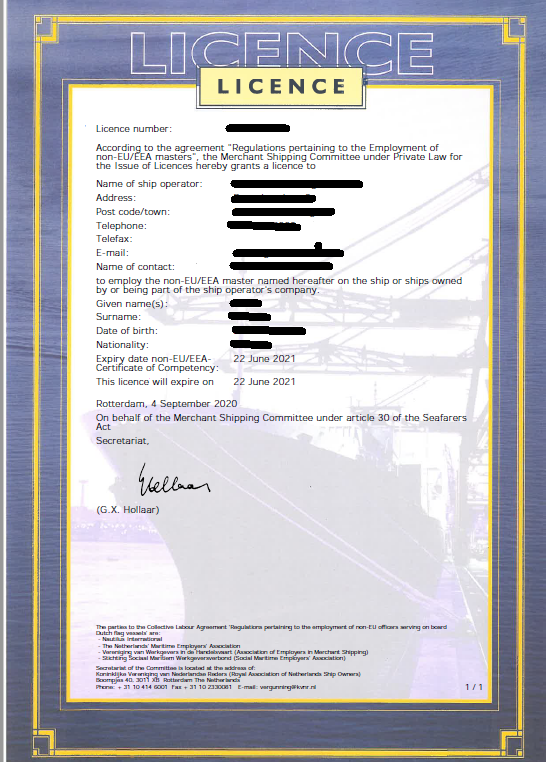1 Introduction
Article 2.4.1 of annex 1 to the agreement regulates the surveys performed by the Recognised Organisations (RO’s) based on the Survey Guidelines under the Harmonized System of Survey and Certification (HSSC), as further detailed in IMO Resolution A.1140(31), as may be amended.
Part of this resolution states that during several surveys (see below) the conditions regarding the manning of the ship and the manning documents are to be verified. Due to several detentions and an increase of manning related deficiencies, the Netherlands Shipping Inspectorate (NSI) requested the RO’s to give more attention regarding this matter. This instruction provides a more detailed overview of what items to verify, and should be used as a guideline during these surveys.
2 Scope
This document contains instructions for RO’s with regard to:
- checking that the ship’s complement complies with the Minimum Safe Manning Document (MSMD; SOLAS 2020, reg.V/14.2);
- checking that the master, officers and ratings are certificated as required by the STCW Convention, as amended;
- checking that the master, officers and ratings, where applicable, hold the appropriate ships related STCW Certificates of Proficiency (CoP's) as per STCW code chapter V.
3 Application
During the following surveys (all except initial) on RO-classed vessels, abovementioned items (ship’s complement and certificates of competence) are to be verified (in case of a combination of surveys, the safe manning will only have to be verified once, to the full extent):
| Code |
|
Initial (I) |
Annual (A) |
Periodical (P) |
Intermediate (In) |
Renewal (R) |
| E |
Safety Equipment |
|
X |
X |
|
X |
| C |
Safety Construction |
|
X |
|
X |
X |
| R |
Safety Radio |
|
|
X |
|
X |
| P |
Safety Passenger |
|
|
|
|
X |
| L |
Load Line |
|
X |
|
|
X |
| O |
IOPP |
|
X |
|
X |
X |
| N |
Noxious Liquid Substances |
|
X |
|
X |
X |
| D |
Dangerous Chemicals (COF) |
|
X |
|
X |
X |
| G |
Liquefied Gases (COF) |
|
X |
|
X |
X |
| S |
Sewage |
|
|
|
|
X |
| A |
IAPP |
|
X |
|
X |
X |
4 Specific Netherlands’ requirements
Legislation concerning ships'manning is mainly goal based. The basic principle of Chapter 2, section 1 of the Seafarers Act is that the ships' manager bears primary responsibility for safe and environmentally responsible sea passage. The ship's manager also bears responsibility for establishing the minimum safe manning requirement. To acquire a MSMD, the ship's manager has to submit a Minimum Safe Manning Proposal to the NSI, which assesses the feasibility of said plan within the context of statutory regulations with regard to the environment, safety and working hours.
The master of the ship must have the Dutch nationality or the nationality of one of the members the European Economic Area (European Union + Norway, Iceland and Liechtenstein). If not the case, proof of permission or an exemption should be provided for. Also, regulations prescribe that all officers sailing aboard a vessel flying the flag of the Netherlands possesses a Dutch Certificate of Competency (CoC). The Netherlands issues to officers from other EU member states and countries with which it has concluded an agreement (see Annex I), a Dutch Certificate of Equivalent Competency (CEC) on the basis of their own national Certificate of Competency or Certificate of Proficiency (for examples see Annex II).
In general the Confirmation of Receipt Application (CRA) (see annex III) as returned by Kiwa Register on receipt of an application for a CEC can serve as documentary proof the applicant is permitted to serve 3 months pending the issuance of an endorsement (CEC).
The Netherlands acknowledges the principles of a Maritime Officer as interpretation of STCW Convention, Chapter VII (reference is made on the CoC). A (First) Maritime Officer is in possession of an endorsement as (Chief Mate) Officer in charge of a navigational watch and (Chief Engineer) Officer in charge of an Engineering watch, and may be replaced as such (by two officers). To avoid confusion with PSCO in foreign countries, this is mentioned on the MSMD as footnote on each table where maritime officers are applicable.
5 Verification if ship’s complement complies with MSMD
During abovementioned surveys the following items are to be checked:
• A valid original Minimum Safe Mannning Document issued by the NSI is on board……………………...¤
| If not present, the NSI should be contacted and be rectified before departure. |
• The number and positions of the crew are in accordance with the number and qualifications as mentioned on the Minimum Safe Manning Document……………………………………………………...¤
| If not the case, shipmanager should rectify this before departure or contact the NSI for further advise. |
6 Manning certificates
During abovementioned surveys the following items are to be checked:
• The Master of the ship has the Dutch nationality or the nationality of one of the members the European Economic Area (European Union + Norway, Iceland and Liechtenstein). If not the case, proof of permission (a so called RTK license (Regulations pertaining to the Employment of non-EU/EEA masters), issued by a committee of employers and employee’s) or an exemption from the Administration of the Netherlands) should be provided for…………..…..…..¤
| If not the case, the shipowner should rectify this before departure, or contact NSI to apply for a dispensation. |
• All officers are in possession of a Dutch Certificate of (Equivalent) Competency……………………….....¤
A Certificate of Equivalent Competency may only be issued to officers who possess a valid STCW 78, as amended 'certificate of competency' issued in a country with whom the Netherlands has concluded an agreement to accept seafarers (see Annex I). When a foreign officer applies for a Dutch Certificate of Equivalent Competency (CEC) the Inspectorate accepts that in general the Confirmation of Receipt Application (see annex III) as issued by Kiwa Register on receipt of an application for a CEC can serve as documentary evidence that the applicant is permitted to serve 3 months on board pending the issuance of an endorsement (CEC).
If neither a CoC, CEC, Application Receipt or CRA is present the shipowner should rectify this for departure. |
• In case of a Dutch Certificate of Equivalent Competency the Certificate will have a unique number while also mntioning the foreign certificate number.……………..……………....…¤
| If not the case, the NSI should be contacted and be rectified before departure. |
• Masters, chief engineer officers, chief mates, second engineer officers, first maritime officers and any person with immediate responsibility for loading, discharging and care in transit or handling of cargo on tankers shall have an endorsement for “(type of) tanker qualification” …………………..…………...….¤
Masters and officers shall have a Certificate of Proficiency (COP) stating “tanker qualification” in combination with the type of tanker (gas, chemical or oil; also see Annex V). Every rating who is so qualified shall be duly certificated.
If the endorsement is not available or does not match the shiptype, the NSI should be contacted and be rectified before departure. |
• For seafarers responsible for designated safety duties associated with the care, use or in emergency response to the fuel on board ships subject to the IGF Code, the COP basic training IGF-Code is mandatory ……………..……………....…¤
• Masters, engineer officers, dual certificated officers (maritime officers) and all personnel with immediate responsibility for the care and use of fuels and fuel systems on ships subject to the IGF Code shall hold a COP in advanced training IGF-code ……………..……………....…¤
|
Foreign seafarers are allowed to use a foreign COP as long as it has been issued by, or on behalf of, the competent authority of an EU member state, EEA/EFTA member, a country of which the Netherlands recognizes the certificates pursuant to STCW Convention, Annex I, Regulation 10
If the seafarer in question is not in the possession of the required document this should be rectified before departure. |
• Masters, chief mates, officers in charge of a navigational watch, maritime officers and first maritime officers on ships operating in polar waters shall hold a certificate in basic training for ships operating in polar waters, as required by the Polar Code.……………..……………....…¤
• Masters, chief mates, and first maritime officers on ships operating in polar waters, shall hold a certificate in advanced training for ships operating in polar waters, as required by the Polar Code.……………..……………....…¤
• Masters, chief mates and first maritime officers on ships sailing in other polar waters need to be in possession of a COP Advanced Polar-code as mentioned in regulation V/4 paragraph 4. .……………..……………....…¤
|
Foreign seafarers are allowed to use a foreign COP as long as it has been issued by the competent authority of an EU member state, EEA/EFTA member, a country of which the Netherlands recognizes the certificates pursuant to STCW Convention, Annex I, Regulation 10
If the seafarer in question is not in the possession of the required document this should be rectified before departure. |
• All qualified (part of a navigational, or engineering watch) STCW ratings are in possession of a Certificate of Competency and seaman’s book (may be issued by another country). Ratings without watchkeeping qualification do not need a Certificate of Competency but do require a seaman’s book.………………………………………………………..…………………¤
|
Ratings are allowed to serve on Dutch flag ships when holding foreign certificates (of proficiency) issued by the competent authority of an EU member state, EEA/EFTA member, a country of which the Netherlands recognizes the certificates pursuant to STCW Convention, Annex I, Regulation 10, or an IMO White list country (i.e. listed in MSC.1/Circ.1163/Rev.x);
A Dutch seaman's book is not compulsory for foreign ratings or officers, provided they do possess a national seaman’s book in at least the English language. If ratings are not in the possession of the required documents this should be rectified before departure. If qualified STCW ratings are not in the possession of the required documents this should be rectified before departure. |
• A ship’s cook is in possession of a valid COP for Ship’s Cook and seaman’s book………….........…………………………….….¤
|
Certificates (of Proficiency) are accepted on board of Dutch flagged vessels if they have been issued by:
• EU Member States
• EEA States
• Countries with which the Netherlands has concluded an agreement as referred to in Regulation I/10 of the Appendix to the STCW Convention ,as amended
• Countries that have ratified the MLC Convention ,as amended
• Countries that have ratified the ILO 69 Ships' Cooks Convention
A list of the countries that have ratified the MLC, as amended or the ILO 69 Ships' Cooks Convention can be found on the ILO website.
A ship’s cook is only required to hold a COP if the requirement of having a ship’s cook on board is explicitly mentioned on the MSMD. |
NB. The signature of the Certificates of (Equivalent) Competency may differ. Older documents are signed by 'the Head of the Shipping Inspectorate' or 'the Inspector General Transport and Water Management Inspectorate', while the newer documents are signed with 'the Minister of Infrastructure and Water Management'. All above mentioned signatures are correct.
7 Procedure to be followed
Questions or verification
In most cases, any deficiencies related to the MSMD result in a rectification of the deficiency before departure. In all other cases or in case of doubt, the Netherlands Shipping Inspectorate should be consulted. Please note that for verification in some cases Kiwa Register has to be contacted.
|
Netherlands Shipping Inspectorate (Marine and Fishery)
Section Manning Plans
Tel: +31(0)70-456 4672
E-mail: nsi-manningplan@ilent.nl
(Minimum Safe Manning Documents, Manning plans, Exemptions) |
|
Kiwa Register (for verification only)
Tel: +31(0)88 998 4888
E-mail: nl.scheepvaart@kiwa.nl
(CoC, CEC, CRA, COP, Seaman’s book etc.)Tel: +31(0)88 998 4888 |
Reporting
All (and only) deficiencies related to manning of the ship should be reported to the NSI via nsi-manningplan@ilent.nl in a format up to the Recognised Organisations; If no deficiencies were found, this will not have to be reported.
Annex 1 - EU member states and countries with which the Netherlands concluded an agreement
EU member states and countries with which the Netherlands concluded an agreement
| Australia |
| Austria |
| Belgium |
| Bulgaria |
| Canada |
| Czech Republic |
| China |
| Croatia |
| Cyprus |
| Denmark |
| Germany |
| Estonia |
| Ethiopia |
| France |
| Greece |
| Hong Kong |
| Hungary |
| Iceland |
| Ireland |
| India |
| Indonesia |
| Italy |
| Latvia |
| Liechtenstein |
| Lithuania |
| Luxembourg |
| Malta |
| Montenegro |
| New Zealand |
| Norway |
| Ukraine |
| Pakistan |
| Philippines |
| Poland |
| Portugal |
| Romania |
| Russian Federation |
| Singapore |
| Slovenia |
| Slovakia |
| South-Africa |
| Spain |
| Sweden |
| Switserland |
| Turkey |
| United Kingdom |
| Vietnam |
Annex 2 - Example of Dutch Certificates
Certificate of competency front

Certificate of competency back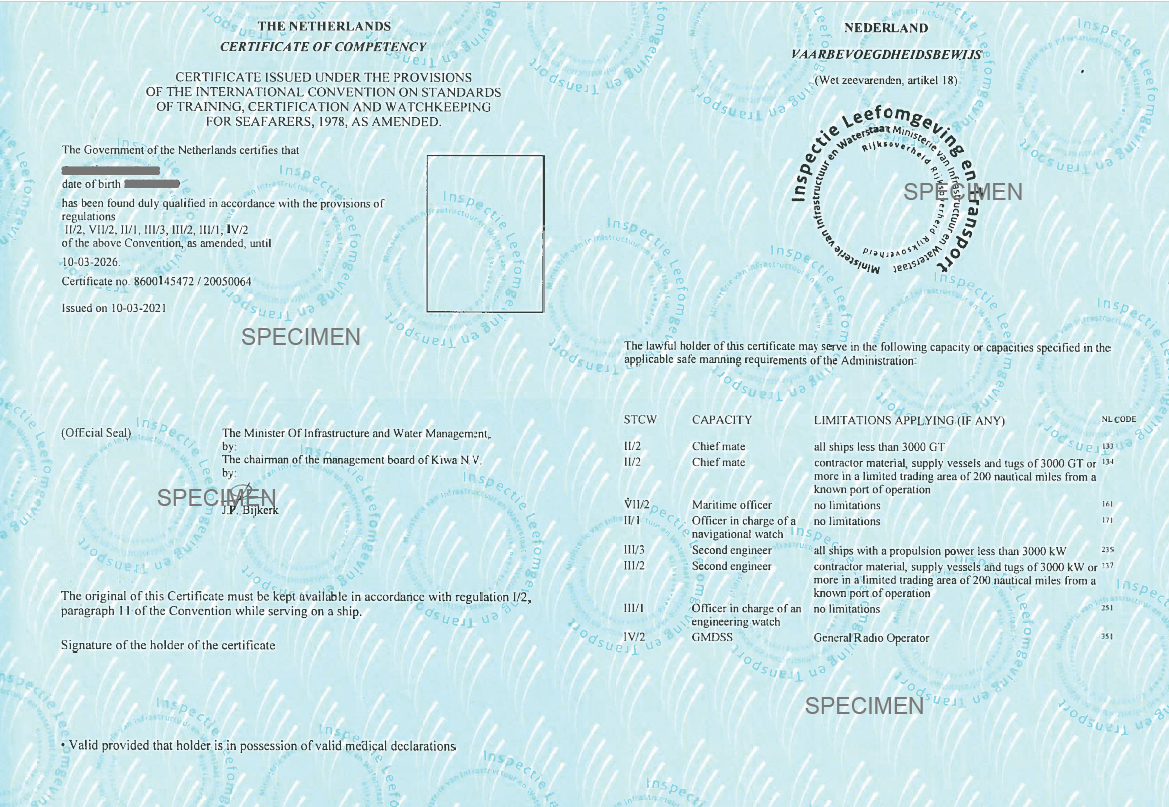
Certificate of Equivalent competency front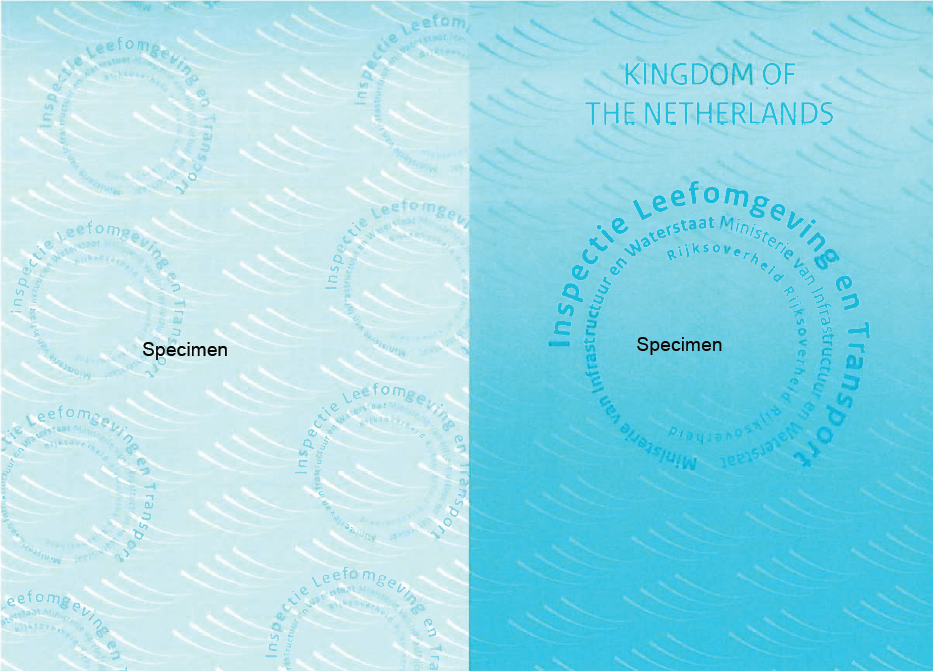
Certificate of equivalent competency back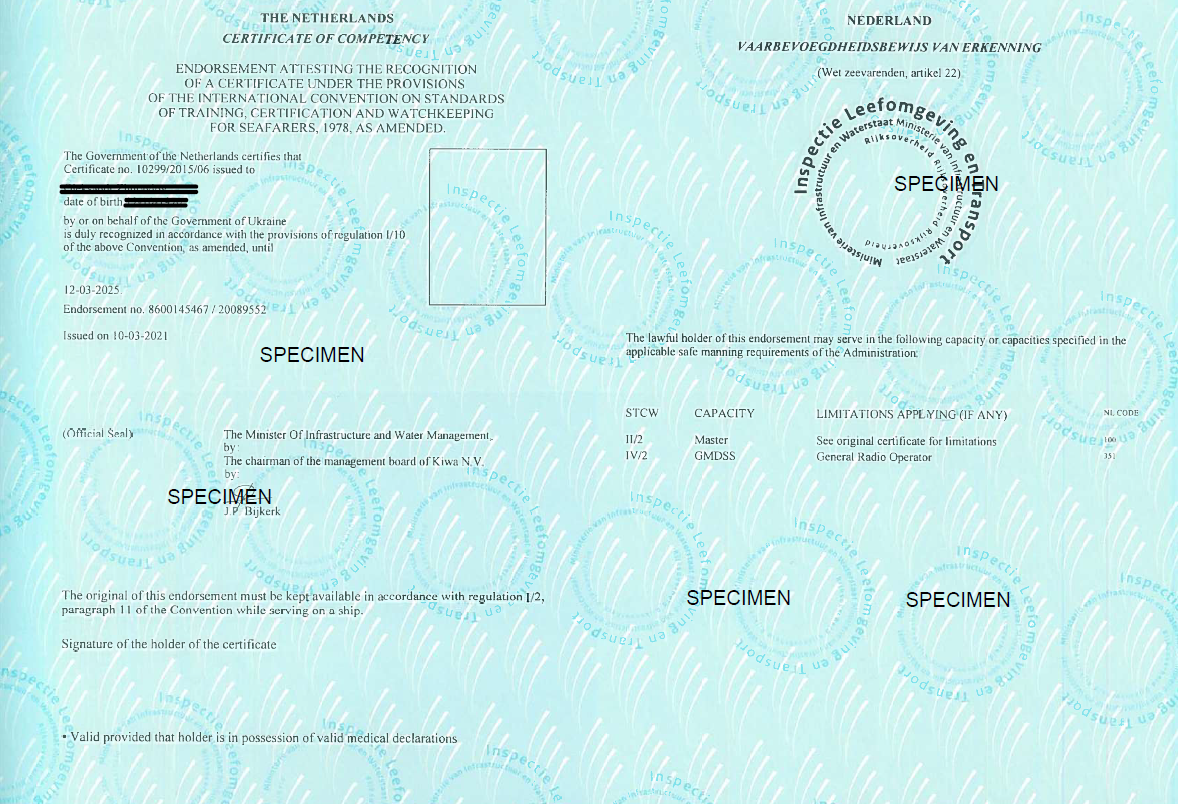
Annex 3 - Confirmation of Receipt Application
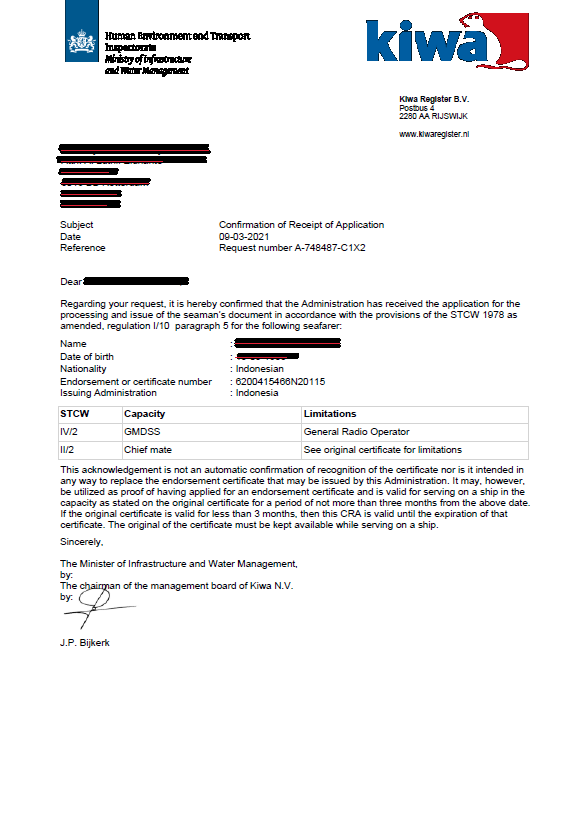
Annex 4 - Example of a RTK-license
